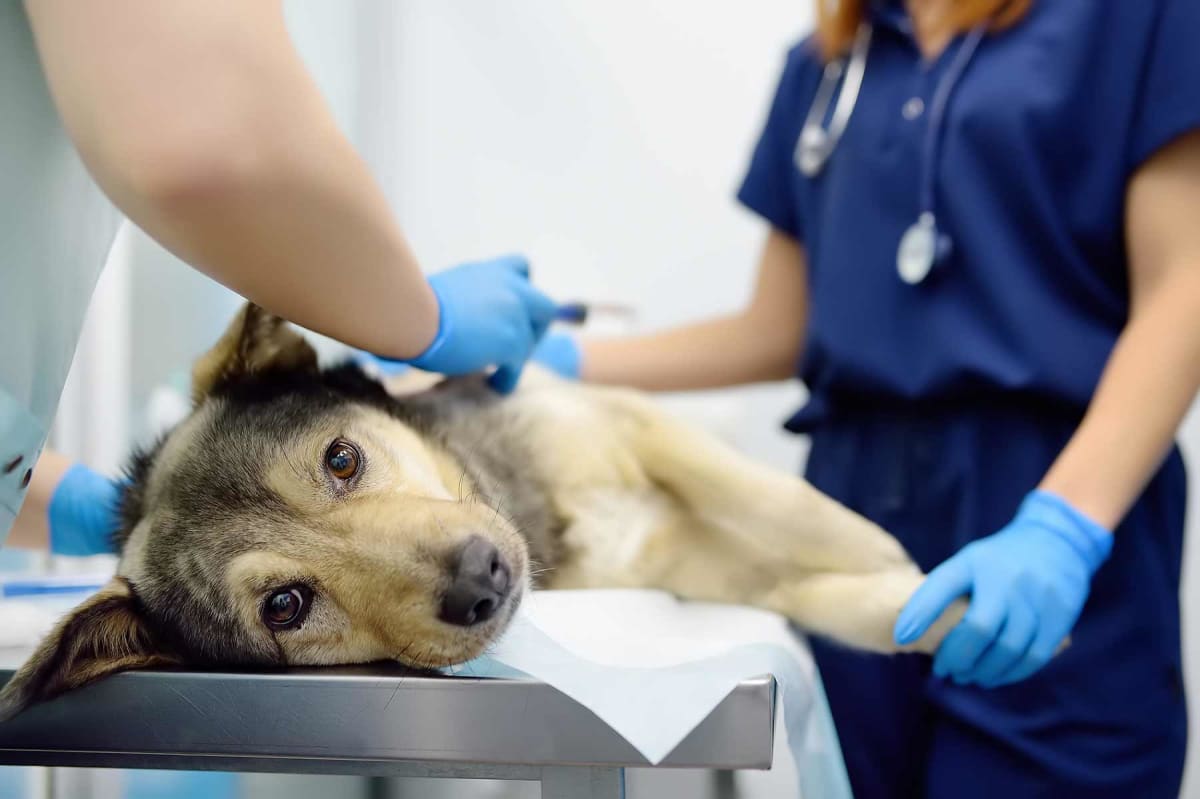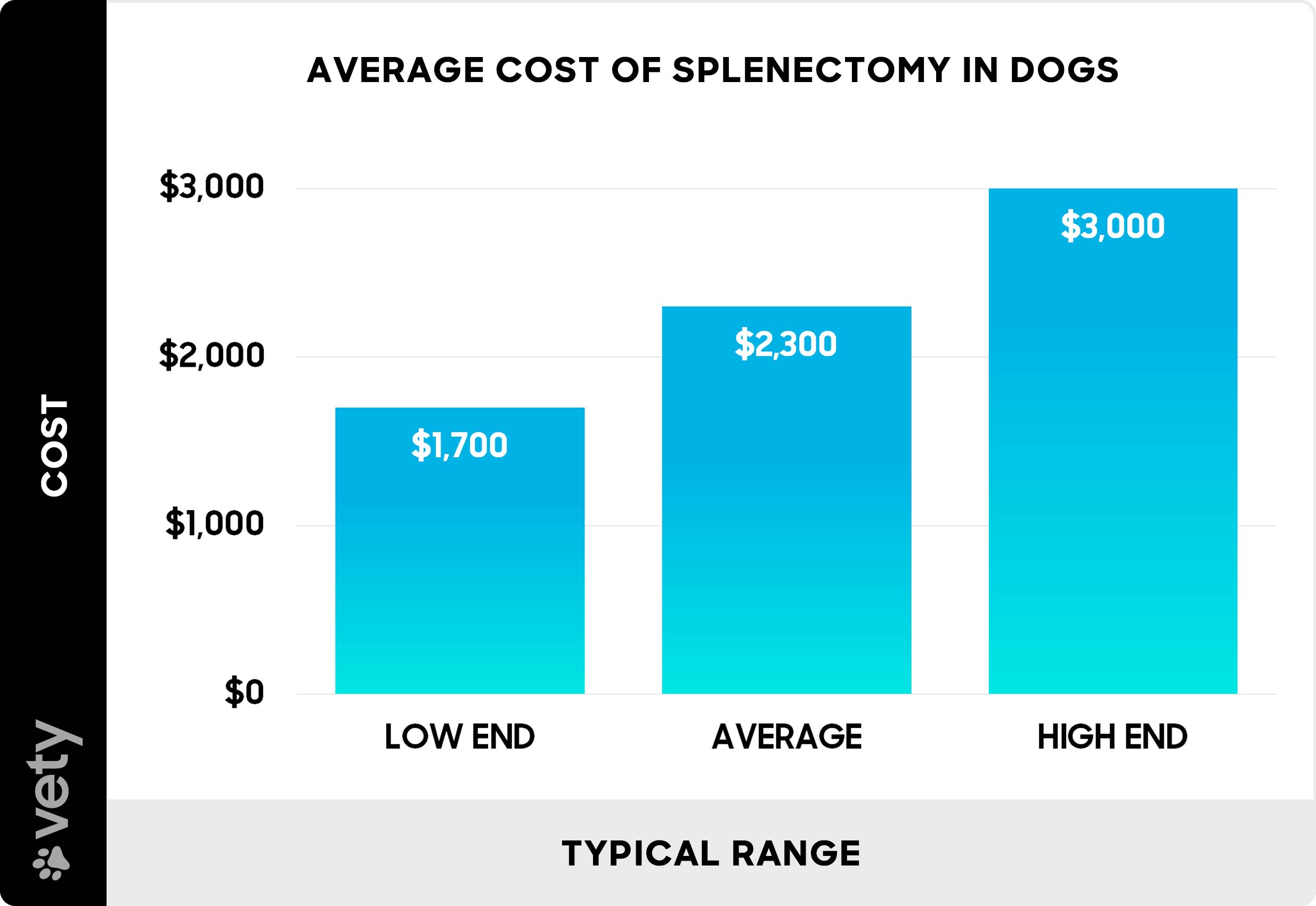
How much does a dog splenectomy cost?
How much does a dog splenectomy cost?
$1,700 – $3,000 average cost
Average dog splenectomy cost
A dog splenectomy costs $1,700 to $3,000 on average. The total cost depends on the complexity of the case, diagnostic testing and anesthesia fees, whether the surgery is an emergency or scheduled procedure, and your location. A dog can live a normal, healthy life after spleen removal surgery.

| National Average Cost | $2,300 |
| Minimum Cost | $1,500 |
| Maximum Cost | $9,000 |
| Average Range | $1,700 to $3,000 |
Splenectomy surgery fees typically include a physical examination, anesthesia, the surgical procedure, and a follow-up exam. Some veterinarians include antibiotics and painkillers in their fee but may charge extra for blood work and other diagnostic tests like X-rays or ultrasounds.
Dog spleen removal cost factors
Several factors affect the cost of a splenectomy for dogs:
Complexity of the case: Costs are higher for dogs requiring emergency surgery due to splenic rupture or torsion due to the urgent nature of the procedure and the need for intensive monitoring.
Anesthesia fees: The type and duration of anesthesia required affect the overall cost. Older dogs or those with health conditions may need specialized anesthetic protocols, which can increase costs.
Pre-surgical tests: Blood work, X-rays, ultrasounds, and other diagnostic tests are essential before surgery. These tests can add to the total cost but are vital for ensuring your dog is stable enough for anesthesia and surgery. Common tests and fees include:
A dog blood test costs $100 to $200.
Dog X-rays cost $150 to $250 per image.
A dog ultrasound costs $300 to $600.
Location: Veterinary costs vary significantly by geographic region. Vets in urban areas and regions with higher costs of living tend to charge more compared to those in rural areas.
Veterinary clinic or hospital: Specialty veterinary hospitals and emergency clinics charge more than general practice veterinarians. However, these facilities often have advanced equipment and specialized staff that may be necessary for complex cases.
Post-op medications: Pain management medications, antibiotics, and other post-surgical treatments can add to the total cost. These medications are essential for your dog's recovery and comfort.
Reasons for a splenectomy
Some common reasons why dogs might need their spleen removed include:
Cancer: Splenic tumors are one of the most common reasons for spleen removal in dogs. Hemangiosarcoma, a malignant tumor of blood vessels, frequently affects the spleen and requires immediate surgical intervention. Other cancers that may necessitate splenectomy include lymphoma and mast cell tumors.
Ruptured spleen: A ruptured spleen is a life-threatening emergency that requires immediate surgical removal. This condition can occur due to trauma, tumors, or underlying blood disorders. Dogs with ruptured spleens may experience internal bleeding, weakness, and collapse.
Splenic torsion: This condition occurs when the spleen twists on its blood supply, cutting off circulation to the organ. Splenic torsion is more common in large, deep-chested dog breeds and requires emergency surgical intervention to prevent tissue death and severe complications.
Infection: Severe splenic infections that don't respond to antibiotic treatment may require surgical removal. Abscesses or chronic infections can compromise the organ's function and pose risks to the dog's overall health.

Dog splenectomy FAQs
How long does a splenectomy take in dogs?
A dog splenectomy takes approximately 1 to 3 hours, depending on the complexity of the case and any complications that arise during surgery. Emergency procedures may take longer due to the need for stabilization and careful removal of damaged tissue. The surgical team will monitor your dog's vital signs throughout the procedure to ensure safety.
How long can a dog live after a splenectomy?
Dogs can live normal, healthy lives after spleen removal. The liver and other organs take over many of the spleen's functions, allowing dogs to maintain a good quality of life.
However, the prognosis depends on the underlying reason for the surgery. Dogs with benign conditions often live their normal lifespan, while those with malignant tumors may have a different prognosis depending on the cancer type and stage.
Questions to ask your veterinarian
Ask your veterinarian these important questions to ensure you understand the surgical procedure, risks, and recovery process:
What is the underlying cause requiring spleen removal?
How many splenectomy surgeries have you performed?
What are the risks and benefits of the surgery?
What is the expected recovery time?
What post-operative care will my dog need?
Are there any alternative treatment options?
What is the long-term prognosis?
What signs should I watch for during recovery?
When should I schedule follow-up appointments?
Will my dog need ongoing medications or special care?
What is the total estimated cost, including all fees?
When to seek emergency veterinary care
Contact your veterinarian immediately if your dog shows signs of complications after surgery, including:
Excessive bleeding from the incision
Severe lethargy or weakness
Loss of appetite lasting more than 24 hours
Vomiting or diarrhea
Swelling or discharge from the surgical site
Difficulty breathing
Pale or white gums
Early intervention can prevent minor issues from becoming serious complications and may help avoid additional emergency costs.